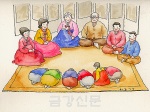 It seems oddly fitting that the words “caregiving” and “caretaking” mean precisely the same thing. Perhaps that linguistic oddity reflects the salient characteristic of care itself: a tension between our desire to receive it and our countervailing feeling of obligation to provide it. Human relations, generally, can be summarized as an on-going battle between those who provide care and those on the receiving end.
It seems oddly fitting that the words “caregiving” and “caretaking” mean precisely the same thing. Perhaps that linguistic oddity reflects the salient characteristic of care itself: a tension between our desire to receive it and our countervailing feeling of obligation to provide it. Human relations, generally, can be summarized as an on-going battle between those who provide care and those on the receiving end.
As a human child, you started out your life as the ultimate care-collection machine. Children are designed to make you want to provide them with care – and you’re designed, as an adult, to feel a profound impulse to provide children with care, especially your own children. It’s no coincidence that anything you identify as “cute” – i.e., feel an impulse to care for – will have child-like features, such as large eyes in proportion to its face and a large head in proportion to its body. These are all evolutionary triggers designed to make us feel like providing care.

The human instinct to care for youngsters transfers over to other young animals as well, and explains, at least in part, your relationship with “man’s best friend.” Everyone loves puppies – baby dogs. But with canines, the phenomenon extends further than that. Adult dogs retain many juvenile features – a phenomenon called “neoteny” – because by continuing to appear puppy-like up to and through adulthood, they can convince humans to keep wanting to offer them care. Dogs literally evolved to look young and cute just so you would care for them – and it’s worked! Unlike most species, the dog’s trick to evolutionary success wasn’t to display aggression, like a wolf. As evidenced by the wolf’s current struggle to survive in a human-dominated habitat, ferocity only gets you so far. For the dog, docility, rather than aggression, was the answer. By appearing cute – a bit like our own young – they mastered a strategy of symbiosis with another species, humans, with a strong instinct to provide care to their own young. The result is humans calling their dog “baby” and bragging to their friends that he’s “just like a member of the family.” In many respects, Fido actually is just like another child. Dogs are a bit like cuckoos in that respect – enlisting another species to do the work of raising their young – but in this case, by remaining young-looking throughout their adulthood, they lead another species to treat them like its own children for the duration of their lives.
Human children are also master care-harvesters – they have to be, because they remain dependent on adult care for survival for much longer than other species. Adult humans possess large brains, which could never fit through the human birth canal. Our children are thus, of necessity, born with a relatively tiny, undeveloped brain, leaving them utterly helpless and dependent on the care of others for many years. Humans thus possess a strong instinct to summon care as a child, but also a corresponding (and conflicting) instinct to provide care for helpless young humans. Awww…it’s a cute little baby. I want to take care of it.
Thus do we perpetuate our species. But this evolutionary arrangement sets up an internal battle between the child within you who’s hungry for care and the adult who feels obligated to provide it.
Some humans work pretty hard to be treated like children – and receive care – for their entire lives. One trick is to keep acting helpless and wait for someone to come and care for you. One of my clients was complaining about her parents recently in this regard. She grew up knowing she would have to care for them – they steadily broadcast helplessness, “parentifying” my client from her earliest years, leaving her in the position, even as a child, to tackle most of the care-providing. This year, as always, my client took her mother out for her birthday, then fumed silently as Mom ordered the most expensive items on the menu. Christmas will be the same thing – her mother will insist on exchanging gifts, with the understanding that the daughter will be expected to lay out big bucks – and the mother will buy tokens in return. In any case, this client’s parents were living on her handouts – they’d overspent for years, digging themselves into a deep financial hole.
In my client’s case, her parents are demanding care – behaving, in fact, like children. But if it’s unpleasant having an adult demand constant care – why should it be any different with a child? Why introduce someone into your life who is expected to rely on you for care? This raises the question of why people have children. And indeed, some parents seem to misunderstand the roles of parent and child, seeing the child as the provider of endless love and care instead of the receiver of it. Ask one of these folks why they’re having a child, and they might even say so outright: I want someone in my life who will love me completely.
The idea seems to be that endless care will produce endless gratitude – to put it bluntly, a payoff. You do absolutely everything for the child – attend to his bottomless need for love and care…and then he looks at you with those big eyes and says “Mommy, I love you”…and it’s all worth it. And maybe, sometimes, it is.
 A more purely mercenary perspective argues that at some point the tables inevitably turn anyway, and the children – now adults – are supposed to take care of you, the parent. This switching of roles is played down in Western culture, but in Asia, it’s taken for granted. Many of my Asian friends simply shrug and write a check to their parents every month because that’s what’s expected of them.
A more purely mercenary perspective argues that at some point the tables inevitably turn anyway, and the children – now adults – are supposed to take care of you, the parent. This switching of roles is played down in Western culture, but in Asia, it’s taken for granted. Many of my Asian friends simply shrug and write a check to their parents every month because that’s what’s expected of them.
I’ll never forget a television ad I saw once on a flight to Hong Kong. Western Christmas advertising is all about the children – the iconic image is delighted little ones hungrily tearing open gifts under a tree, with the worn-out but adoring parents thrilled that the heap of capitalist loot they’ve provided has once again managed to please the appetites of the youngsters. But this Hong Kongese ad, framed around the Chinese New Year, presented precisely the opposite scenario – a shock to my Western sensibilities. In the advert, a humble, slightly intimidated-looking young couple arrive at the entrance to a house and ring the doorbell. The door opens, and grandma and grandpa loom in the threshold. The young couple bow humbly, mumble ritual pleasantries and present gifts. Behind the young couple, barely visible, stand two young children, heads bowed in reverence.
The scale can tilt either way – toward the elders or towards the children, but it all still boils down to who gives care – and who receives it.
One big step forward comes with learning to ask for care directly – not acting out your need silently by collapsing and going victim or martyr, or going co-dependent and expressing your need by providing the care you yourself crave to others (seethis post for more on that pattern.)
A second big step – the one that counts the most – is realizing that you contain both a helpless child within you and a parent who is more than capable of providing all the care that child needs.
 There is a loss, giving up the fantasy of a perfect other providing all the care you need. Some people cling to religion to avoid this loss, and construct an imaginary provider of care – a god or saint or the like.
There is a loss, giving up the fantasy of a perfect other providing all the care you need. Some people cling to religion to avoid this loss, and construct an imaginary provider of care – a god or saint or the like.
But there is also a gain that comes from letting go of the fantasy. In separating from your parents, and the dream of perfect care, you transform into an adult, and gain a new strength that comes with self-sufficiency. You can no longer be abandoned, because you always have yourself, a capable adult, by your side. You no longer have to experience solitude as abandonment.
This doesn’t mean adulthood equals solitude. You can gather friends, and your family, around you, and ask them directly for care – and they might even provide it, and you might chose to provide them with care, too, out of love and gratitude for their friendship or just because your own cupboard is full and you wish to celebrate your abundance by sharing care with others.
 But you are no longer the infant, abandoned in the cradle, who screams and cries because his life depends upon someone else coming to his rescue.
But you are no longer the infant, abandoned in the cradle, who screams and cries because his life depends upon someone else coming to his rescue.
You can come to your own rescue.
==========
My new book is a comic novel about a psychotherapist who falls in love with a blue alien from outer space. I guarantee pure reading pleasure: Bad Therapist: A Romance.
Please also check out The People’s Therapist’s legendary best-seller about the sad state of the legal profession: Way-Worse-Than-Being-Dentist
My first book is an unusual (and useful) introduction to the concepts underlying psychotherapy: Life is a Brief Opportunity for Joy
(In addition to Amazon.com, my books are also available on bn.com and the Apple iBookstore.)









Leave a Reply